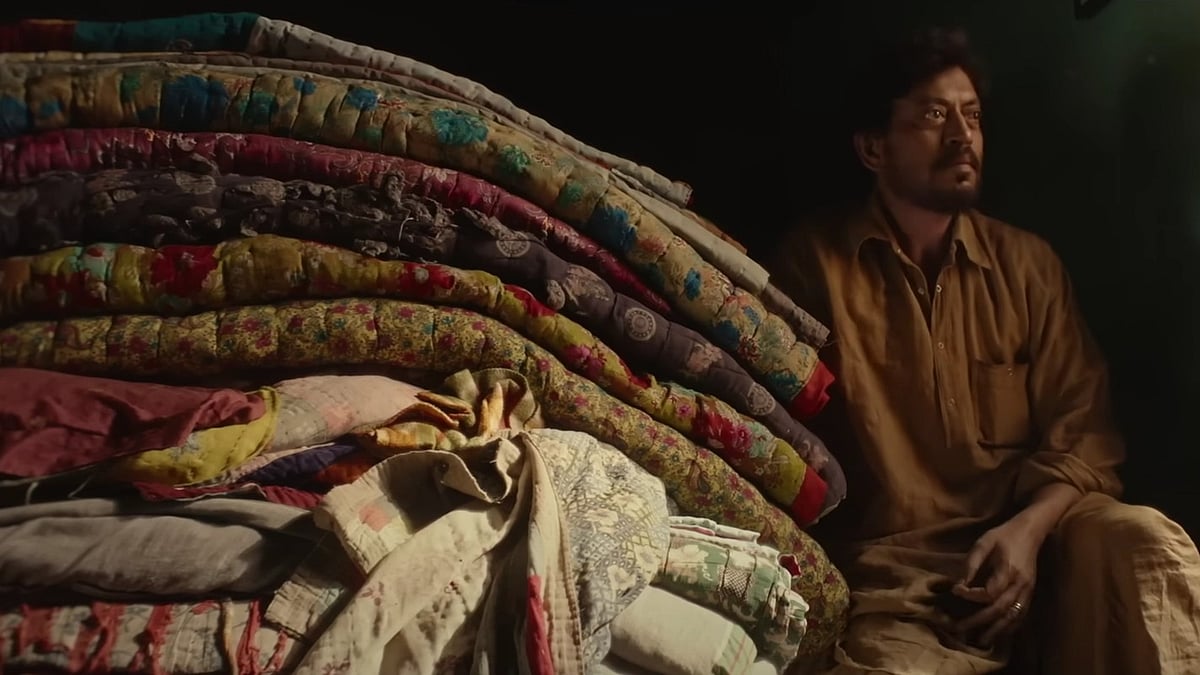The Song of Scorpions Review: Irrfan’s Swansong Bites but Falls Short of a Sting
'The Song of Scorpions' is directed by Anup Singh and stars Irrfan and Golshifteh Farahani.

advertisement
Anup Singh’s The Song of Scorpions might be Irrfan’s last release in India but it would be unfair to label it a purely Irrfan film because a lot of the film’s spirit comes from Iranian actor Golshifteh Farahani. The film centers a legend of ‘scorpion singers’ – tribal women whose voices can counter even the deadliest of poisons; here, a scorpion’s.
Golshifteh Farahani and Irrfan in a still from The Song of Scorpions.
(Photo Courtesy: YouTube)
Farahani’s character Nooran is such a figure of legend, growing under the tutelage of her grandmother Zubeida (a brilliant Waheeda Rehman). She enters the film surrounded by an almost supernatural hue and people watch mesmerised as her voice echoes across the vast, sandy plains of the Thar. One of the people in this crowd is a camel trader Aadam who claims to be in love with Nooran.
It would be near impossible to talk about The Song of Scorpions without applauding the cinematography by Pietro Zuercher and Carlotta Holy-Steinemann and the original songs by Madan Gopal Singh. Music can have an almost ethereal effect on people, stunning some into silence while moving others to tears. Singh’s songs (accompanied by Beatrice Thiriet’s theme) have a similar effect in the film.
The camera zooms over the sand dunes with an almost caressing motion making the world that surrounds Nooran both her prison and her haven. The vastness of the desert points at the fact that there is no escape but the dunes also hold secrets, evidenced by the two open-ended plotlines in the film. The sands, devoid of trees, are revealing and concealing at the same time.
Waheeda Rehman in a still from The Song of Scorpions.
(Photo Courtesy: YouTube)
And all of this is beautifully put forward by the cinematographers. In a particularly brilliant scene, the camera rakes over the sand making it seem like we’re seeing the landscape from a distance but it’s all a trick of lighting.
The theme of ‘poison’ is ever present in Singh’s film; how poison can be both venom and anti-venom depending on the handler.
Irrfan, as always, gives such a powerful performance that even the simplest of changes in his expression convey the meaning they must. The seasoned actor takes the meaning of Scarface’s “The eyes, they never lie!” to a whole other level. When his eyes must portray grief, they do and when they must display menace, they do.
(Trigger warning: The next few paragraphs contain mentions of sexual assault)
Other than slipping out of her accent a bit in the first half, Farahani’s act as Nooran is a revelation. When Nooran decides to take back agency of her life, Farahani’s body language changes ever so subtly and it’s this finesse that adds to the film’s soul. There is however, one glaring issue – the way the film deals with sexual assault is two-fold.
Golshifteh Farahani in a still from The Song of Scorpions.
(Photo Courtesy: YouTube)
After Nooran is sexually assaulted by Aadam’s friend, two things are set in motion – the way society treats survivors and what Nooran decides to do going forward. The Song of Scorpions does, to its credit, deal with the aftermath of the horrific incident with an insightful lens.
So where’s the issue?
The rape and revenge genre (and I must add I have my skepticisms about the term) was wildly popular in the 1970s but has since then received (rightful) critique about its morality and nuance. The genre was used as a tool for cinema about women majorly because of its ability to invoke a sense of vicarious justice (a concept that is still alien for most survivors). But the genre’s very existence sits on a violent act and that necessitates that filmmakers deal with the genre with nuance.
Irrfan and Shashank Arora in a still from The Song of Scorpions.
(Photo Courtesy: YouTube)
That doesn’t exactly happen in The Song of Scorpions because self-destruction mixes with revenge and survival and that’s not a good fit here. And this is a pity because this film comes from the same filmmaker behind Qissa, an absolute revelation of a film.
But the magic of Qissa is reflected in the character of Aadam; a biting critique of the ‘Nice guy’ incel. When we see him patiently waiting for her everyday, we also see that he grabs her hand and doesn’t let go. After some men beat him up believing he’s harassing Nooran, he holds her responsible. When she denies the charge, there’s a bite, a malice in his voice when he says something on the lines of, “You didn’t stop them.” The writing for the characters is exceptionally astute.
Irrfan in a still from The Song of Scorpions.
(Photo Courtesy: YouTube)
A random scene set in a brothel doesn’t lend much and Tillotama Shome is woefully underutilised. Shashank Arora isn’t on the screen for long but his last scene in the film has a lasting impact. The film’s pacing makes it hard to sit through but every time the women start to sing, you feel your skepticism and your critique slip away almost like the film is lulling you into comfort.
(At The Quint, we question everything. Play an active role in shaping our journalism by becoming a member today.)